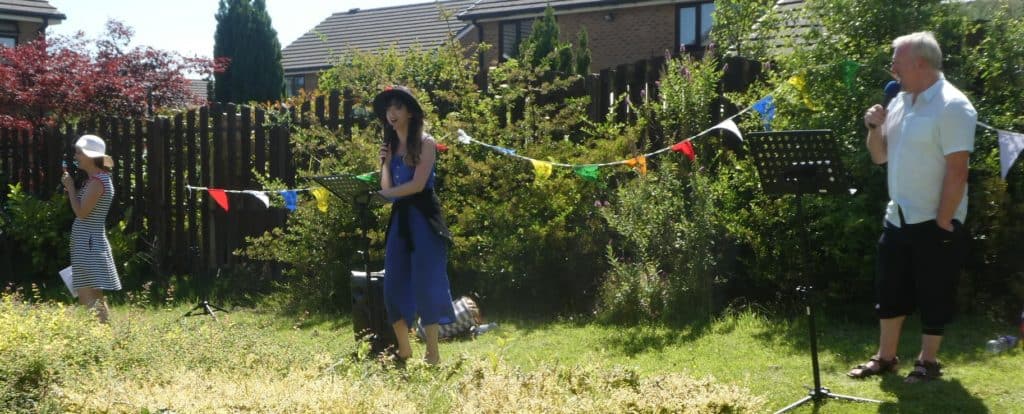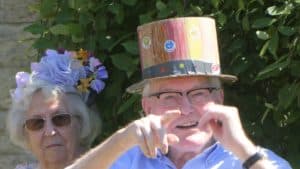Mobile Matinee

Author: Ruth Preston
“How are you doing Moira?”
“Awful, this is like a horror story.”
“Are there any comparisons to your memories of growing up in World War 2?”
“No – in the war we had a strong sense of community. People came together. This is dreadful! Not seeing family or friends, not able to go out. You wouldn’t wish it on your worst enemy.”
Moira (92) is a regular attender at the weekly social group held at the church centre and comes along to the monthly visits we make to the lounge of the residential home where she lives. Her thoughts have been expressed by many others we have spoken to throughout lockdown as we maintain weekly contact over the phone. One gentleman (93), who received a medal from the Queen recently for his endeavours to set up community groups over the years, said to me, “I feel like a lost soul just drifting down a river.”
As the weeks have rolled on, we have become increasingly concerned for our older friends. We are recognising significant deterioration in general mental health and those with diagnoses of Dementia. For those who were previously recovering from falls, physical health has also taken a sad turn as physiotherapy has not been possible through this time.
Restrictions on lockdown are lifting at a rapid pace and we are noticing three responses: firstly, fear at re-entering a world without a vaccine for COVID-19; secondly, a general reluctance to re-engage as people have adapted to a much smaller world than they have previously known, and thirdly, eagerness to get groups back going as quickly as possible.
Does the UK Church have a role in affirming the value of older people through connection at this time? If we are to follow the biblical mandate to honour the elderly, then undoubtedly the answer is yes. I have heard many wonderful ways in which this is happening – including the Daily Hope free phoneline set up by the Anglican church, well-being parcels and telephone befriending.
We keep asking God about our concerns for those who are fearful or feeling increasingly reclusive: How can we encourage social interaction and walk people back into community safely through this? The following is how we have started and how we hope to continue each month for the time being – with much encouragement from the local council and Public Health.
In June, we posted packs through each of the flats of the two residential homes in the village which included a quiz, a ‘Keeping Well at Home Booklet’ (courtesy of Public Health), a ‘HOPE’ magazine (courtesy of Good News which included exerts from Psalms and John’s gospel), a face mask, a chocolate bar and a letter inviting them to join us on a certain day in the central garden for a short time of fun and frolics. The letter also had guidelines for social distancing and encouraged any whose flats looked onto the main gardens to join in from windows and balconies. As a bit of fun, we also held a hat competition in homage to Ascot season and gave prizes for the best hat and winner of the quiz.
Manchester and sun are something of an oxymoron, but praise God for that scorching week we had at the end of the month. That they came wearing their Ascot hats also felt like God’s providence in protecting them from the heat! We spent an hour at each complex singing classic songs with karaoke backing tracks through our simple portable speaker and microphones; had fun with Play Your Cards Right and, to close the time, the minister shared the story behind Amazing Grace and we sang it through acapella style. The third venue we visited was the local care home where we would usually have a monthly traditional service. The residents gathered with the staff in the garden while we stood on the other side of the low fence. Three hymns and a short gospel-talk later and we finished the time with a sing-a-long of songs they would know.
It was a sheer delight to see some of our friends in person and also to meet residents we did not know. They commented afterwards how nice it had also been to see each other as their communal lounges are still closed and they rarely pass in the corridors. The feedback suggested it was more than appreciated. It came as a ‘ray of sunshine’ one person said.
I’m always struck by the scene in Shawshank Redemption where the main character (a prisoner) takes advantage of being given access to the wardens’ office. He locks the door, turns on all the speakers in the prison and places the microphone next to the old record player while it plays a beautiful opera duet, bringing every person to a standstill. The narrator (another inmate) says:
“It was like some beautiful bird flapped into our drab little cage and made those walls dissolve away… and for the briefest of moments every last man at Shawshank felt free.”
It doesn’t need a trained opera singer to bring a moment of joy in the lives of our older friends – just being remembered and having a sense of belonging in community. This is something the Church can encourage and so make for a warm reception for the gospel of hope.

Debs Fidler leads ‘Mobile Matinee’ and is a community worker at Hope Community Church in Mottram, Great Manchester.
